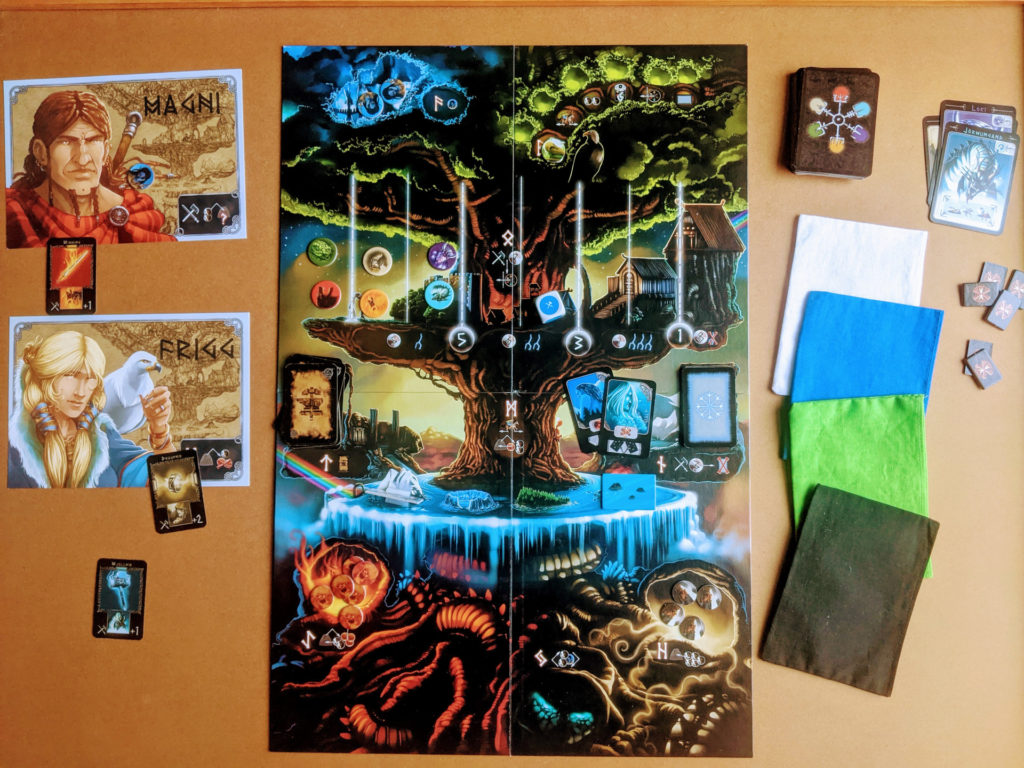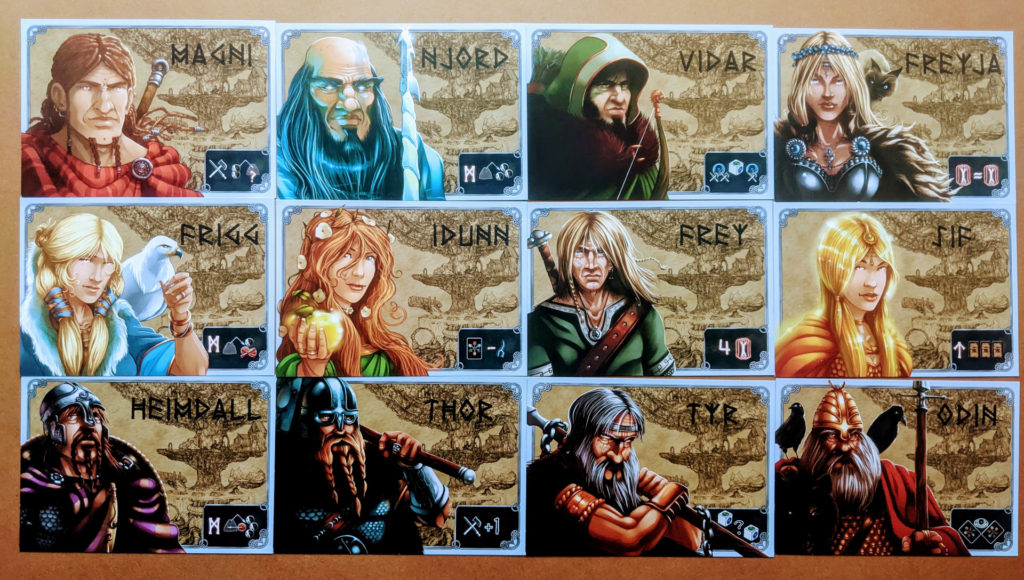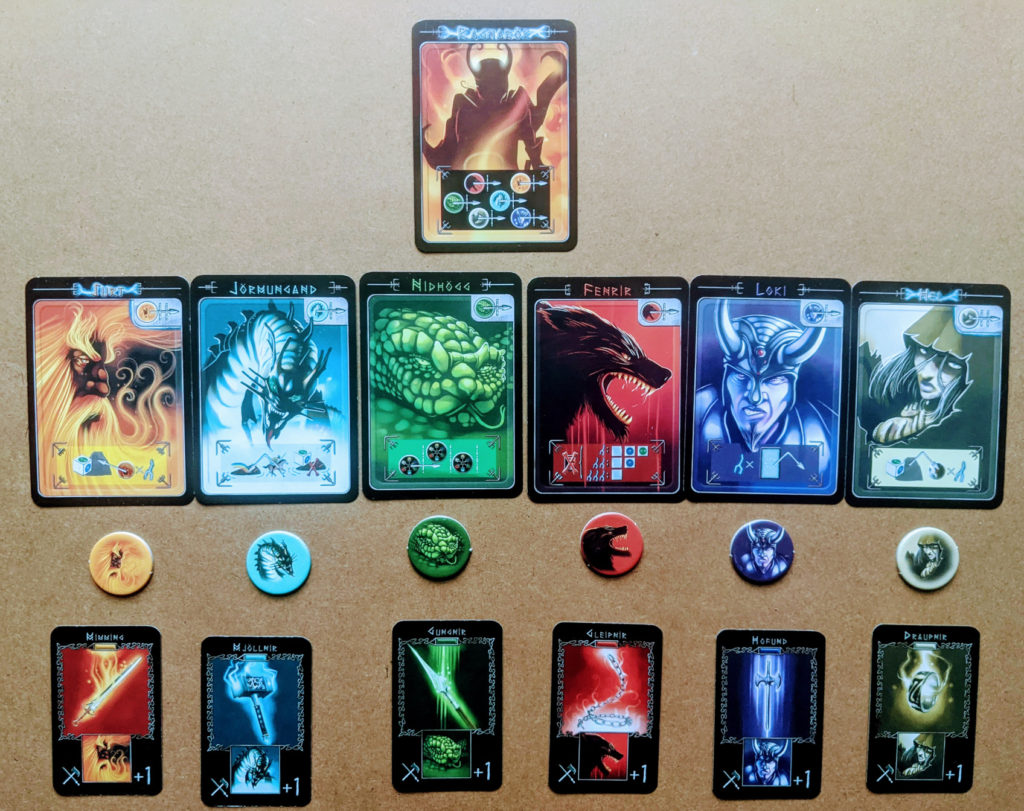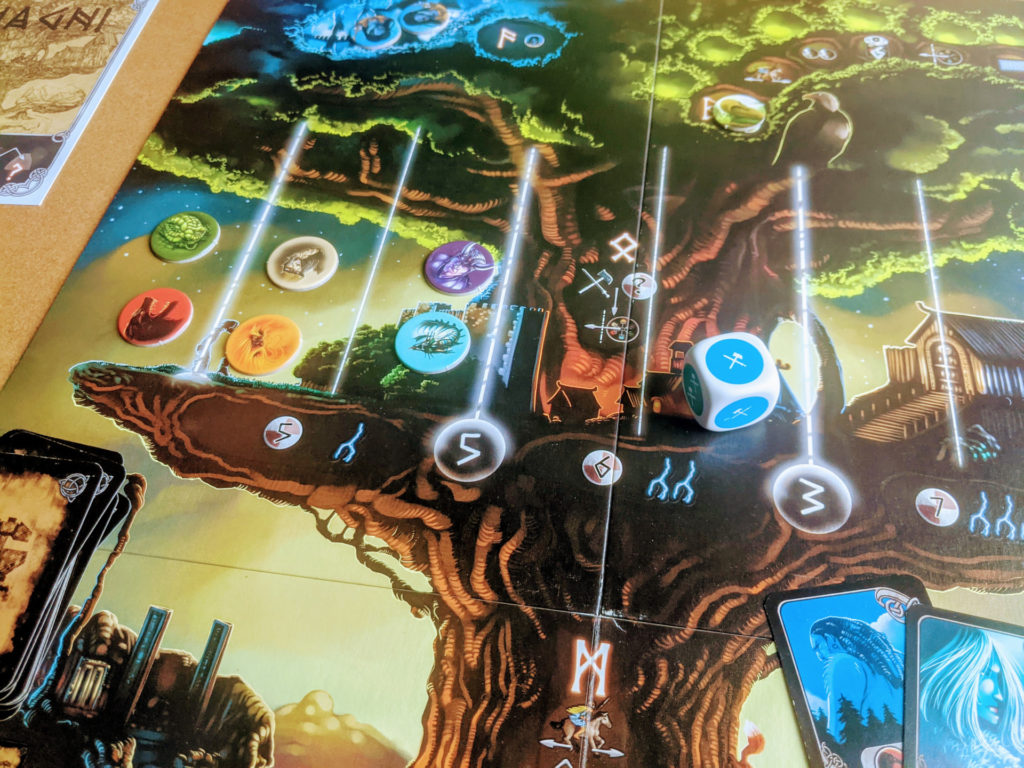“Do I take out Fire Giants first and then Vikings or the other way around?”
“That is a good question. There are 8 Vikings and 5 Fire Giants, you either draw 3 tokens randomly and keep the Vikings or draw 5 tokens randomly and discard the Fire Giants.”
“OK, so, the chances of drawing 3 tokens randomly and all of them are Vikings are…”
“[8! / (5! * 3!)] / [13! / (10! * 3!)], or something along those lines”
“Nice, progress. The chances of drawing 3 randomly and only 2 of them are Vikings are…”
“We need an Excel for this.”
…5 minutes later…
“You know what, screw this, I’m going to take an Elf and risk it.”
In Yggdrasil, you take the roles of Nordic gods defending Asgard during Ragnarok against enemies you have recently seen in Marvel movies, like Loki, Hel, Fenrir, and Surt, and two other enemies you have not seen in Marvel movies like that snake and that other snake. Every turn a random evil enemy crawls a bit closer to Valhalla, does their specific evil action, and then the valiant god heroes try to push them back. You have three actions to spend anywhere in the Nine Realms: you can gather Vikings to aid in the final battle, collect Dwarven artifacts, engage in other shenanigans, and most importantly, you can fight the enemy.

You lose the game if a certain number of enemies advance a certain number of steps. For example, four enemies can breach the outer walls, that’s fine, but if a fifth one comes in, you lose. Similarly, two enemies can reach the inner walls, that’s fine again, but if the third one comes through, you lose. And finally, nobody can reach Odin’s inner chamber, otherwise, you lose. If you manage to halt the enemies’ assault for long enough (until the deck runs out), you win.
As you can see, Yggdrasil follows a pretty standard turn-based co-op boardgame template. There are some unique elements sprinkled on top, the most interesting idea is probably the Midgard section. Here, you have four different islands, represented by cloth bags, and each of them contain Vikings and Fire Giants. This is the most convenient place where you can get Vikings, and you will definitely need them in the fights. You can move the Valkyrie figure to a neighbouring island, and search for Vikings by blindly picking three of the tokens in the cloth bag. You can keep the Viking figures you draw, but the Fire Giants have to be put back in the bag. And there are a bunch of actions and events that revolve around these islands. Two of the enemies either put in more Fire Giants or discard Vikings, you can “cleanse” an island of Fire Giants, you can put in more Vikings to “farm” later, etc. And then you also have the option to move to different islands, the ones farther away from the starting point have a better chance of finding good Vikings, but one of the enemies also sinks an island randomly, and places the Valkyrie figure back to the starting point.
Wow, I talked a lot about Viking islands, didn’t I? I don’t know, there is something intriguing about this mechanism…
There are also some Ice Giants you can fight in the game, a pretty satisfying solution is that you can kill “sets” of them, and placing the cards on top of each other draw a rune symbol which you can use as a powerful one-time aid.
The fight itself against the enemies is pretty simple:
- You start with a fix amount of strength from your Dwarven artifact, if you have any.
- You can add any number of Vikings before you roll.
- Then, you roll the one over-sized die the game comes with.
- Finally, you can add Elves after you know the outcome of the die roll. That’s an advantage over Vikings, but Elves are harder to come by.
- Compare the sum against the enemy’s current strength.
As mentioned earlier, you take the role of a Norse god, they all come with special powers: they might be stronger against Ice Giants, handle Vikings more efficiently, be able to do more actions in a turn, etc. There are a lot of gods to choose from, some are more fight-focused, some excel at supporting others, others have useful utility skills like foreseeing the order in which the enemies will attack.

The Good
I think the best part of Yggdrasil is the meta gaming around the actual game: deciding which gods to use, how they might combo, which order we should go, who should focus which enemy is fun. With four gods, Yggdrasil is quite complex, it’s hard to keep all the godpower options in mind. And you do need to play close to optimal, there is no faffing around in Asgard!
The predictable randomness can also be satisfying, you need to plan ahead basically the whole game, decide which enemy gets how far. You quite often have to override your gut instincts and think about the situation and the actual win conditions. You can’t keep all the enemies out, you simply can’t reliably push back an enemy in each turn, so eventually, they will get in.
It’s an efficient game, rules are simple and clean, box is small and efficiently packed, the components are simple but functional. Compared to the overproduced board games these days it looks a bit toned down, but I’m fine with that.
The setting is quite “history booky”, there is no cartoon nonsense, the rulebook even has these educational texts from historical sources that I assume to be legit because the fonts are in italics. I think in an overused setting like Norse mythology, this dry and original approach is a refreshing one.
The co-op engine is also quite unique in Yggdrasil, I am aware this is not something a lot of people would care about, but I find it interesting, so here we go. Usually, in co-op board games, there are two types of relative strength level development between players and adversaries: it’s either the enemy starts strong, the player is weak, and they get stronger or stronger until they manage to defeat the enemy, or the enemies are constantly getting stronger and stronger, and your task is to hold out long enough. In Yggdrasil, it’s kind of weird: you get really strong in mid-game, once you have your items and start killing giants and manage to combo a rune, but after that, the enemies get stronger once again in the end game, and you just hold on for dear life. By the end, it always feels like the enemies would have overwhelmed you in a couple of turns, had you not finished the game in time.

The Bad
Looking at the cover art, you would probably expect a game of intense action and excitement. What you find inside is the opposite of that, a lukewarm, arithmetic-based puzzle challenge. You constantly have to calculate the probabilities of the Viking bags, see if the optimal solution is to cleanse the Fire Giants, to put in more Vikings, or to search for Vikings. Not to mention the enemies, you have to keep individual projections of where they might end up in a certain number of turns, considering how many cards they already have out. There is very little room for spontaneous epic fights. And I can’t help but imagine these ancient gods with a bloodied face, full-on Berserker mode, ready for battle and then they decide to count some cards instead.
Yggdrasil is not epic, does not feel like it’s escalating correctly. Exactly the same thing happens by the end as it did in the beginning. You are not getting that much stronger, but enemies are not getting stronger either, they just keep coming, and your resource is the number of steps they can take without you losing the game. But that resource is obviously finite. So it’s quite depressing to see that on the long run, there is no way you can win. You just try to keep alive until they… run out of cards?
The win condition of surviving for X turns is really not fitting this game. It would be OK in a zombie survival type of deal, but not in this epic setting. Consider how the good games do it. In Pandemic, you find the cure for the diseases, so it’s easy to clean and eradicate them, from that point, you can see why you would win. In Ghost Stories, you need to defeat the big baddie at the end of a seemingly endless horde of ghosts it set upon the village. In Spirit Island, you slowly grind down the settlers until they have no choice but to leave your island alone. And what happens in Yggdrasil? Loki and Surtr are on the walls to Valhalla and there is that sea serpent thing, they are destroying everything and Hela is banishing the Viking spirits from the afterlife and Fenrir threatens to swallow the whole world and oh Odin they are almost in the main chamber but then… it’s suddenly 5 o’clock so they go home…?
The difficulty is weird. To kick things off, I really hate when I have to set the difficulty level for myself, because that’s exactly what I pay you for, dear game designer. Tell me what a good amount of challenge would be in your game. There are optional extra cards you can put in the deck that makes the game more difficult. Without any of these cards (or even with only a few), Yggdrasil is a cakewalk, with all of them, I am convinced the game is literally unwinnable. So the sweet spot is somewhere in the middle, but it’s really hard to pinpoint.
But that’s nothing compared to the difficulties brought in by additional players. Yggdrasil does not scale at all, and the more players you add, the more difficult it is going to be. See, after a while, it’s really inefficient to fight an enemy without the dedicated artifact, but there is also just one of each, so an enemy will be assigned to a certain god, and that god, and only that god, will fight it. But you will quickly run into issues due to the random order in which the enemies come. For example, with four players, you can quite possibly move the same enemy three times and lose the game before the turn of the god with the corresponding artifact comes up. OK, fine, so does the game address it? Does it tell you how many extra cards to use for a specific number of players for a good challenge? Nope. You have to play it yourself 10 times and figure it out.
Another problem is that too many of your decisions are pre-made, quite often you are merely going through the notions. The game gives the illusion of a good medium-complexity ruleset, but most of the options quickly melt away after a basic observation. A couple of examples:
- Everyone needs to pick certain enemies, get corresponding artifact, never fight without artifact.
- Never fight assuming you get a good result, you must always hedge. A wasted turn is too high of a price. You do the hedging with Elves, but you will never have 3. The attack dice has values [0, 0, 1, 1, 2, 3], if you have 1 Elf, you will assume it’s [0, 0, 1, 1, 1, 1], and not count on getting the high ones. Rolling a 3 instead of 2 in this game had literally never made any difference in my plays, because we never count on it.
- Need to fight every turn, and closely plan with the winning conditions. Decide which 2 enemies you let pass the 2nd wall, which 2 enemies can pass through the 1st wall, and which 2 you need to keep out. Once an enemy is in a position where it’s not threatening any more, you never even look at it again.
- Technically, you can venture out with the Valkyre to the farthest islands, but they re-teleport whenever the sea monster attacks, so we always just make the first island a reliable source of Vikings.
- There is a whole realm, the Vanir, that is entirely pointless, unless you go for the last two actions.

In summary, Yggdrasil feels like a very old game that for some weird reason came out in 2013.
The Co-Op
Picking the gods to play, trying to plan how to chain their powers, coming up with effective combos: that is all actually quite fun. Weirdly, this part, preparing for the game, is the most you will interact during the whole experience.
I don’t think we discussed a single step during our last “remind ourselves how this worked for the review” game. Your turn is pretty much pre-determined, so there is not much to discuss. Mechanically, you can’t interact either, you can give each other Vikings but that’s it, and we rarely ever use that action because it is usually obviously sub-optimal.
The Recommendation
Not really. I have some fond memories of this game for random personal reasons, but Yggdrasil is very hard to get excited about, and especially to recommend with a clear conscience. I mean, it’s not terrible. If someone visits us and asks about it, I explain that it is a dry and somewhat dull, but quick game, we might play one, and have an OK time. So I don’t “hate it” hate it. But there are so many great games out there that Yggdrasil really feels like a waste of time in comparison.
If you want a simple and brilliant co-op game, play Pandemic instead. And if you want an epic fantasy with god powers, play Spirit Island. Unfortunately, if it is Vikingy co-op you are after, I can’t recommend anything better.
Info
| Release Year | 2013 |
| Genre | Strategy |
| Difficulty | Medium |
| Number of Players | 1 to 6 |
| Length | 1.5 hours |
Rating
| Overall | Mediocre |
| Story | Bad |
| Co-Operation | Bad |